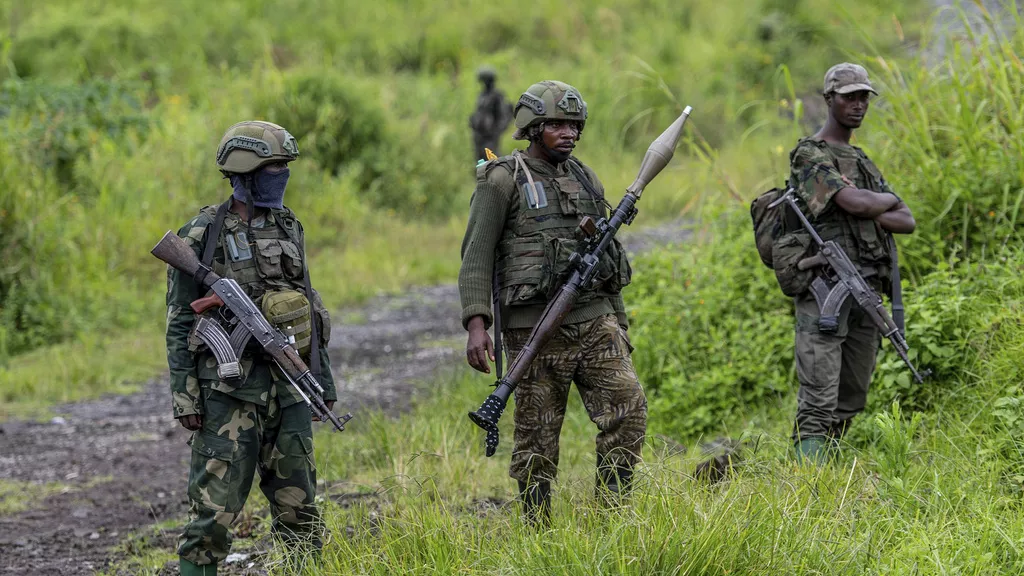
The government of the Democratic Republic of Congo (DRC) has accused the M23 rebel group of carrying out “ethnic cleansing” in the country’s eastern region, following a recent escalation of violence. Jacquemain Shabani, Congo’s Minister of the Interior, made the accusation on Tuesday, denouncing the “massive arrival of foreign populations” in the territories of Rutshuru and Masisi in North Kivu province. According to Shabani, these areas had been home to local populations who were “expelled by violence,” which he argued constituted ethnic cleansing.
The accusation comes after M23, a rebel group that has been active in the region for more than a decade, appointed administrators to govern areas it claims control. This move by the M23 has raised concerns about the group’s growing influence in the region, which has long been a hotspot for conflict.
Eastern Congo, particularly the provinces of North and South Kivu, has seen widespread violence for years. More than 100 armed groups are vying for control of the region, which is rich in valuable minerals. However, the resurgence of the M23 has significantly intensified the conflict, with widespread displacement and a humanitarian crisis now affecting millions of people. According to estimates, more than 7 million people have been displaced by the violence, with many fleeing to areas that are difficult for aid organizations to access.
The M23, or the March 23 Movement, is a predominantly ethnic Tutsi militia group that broke away from the Congolese army in 2012. The group’s fighters were instrumental in seizing Goma, the largest city in eastern Congo, in that same year. Since then, M23 has been a powerful force in the region, despite periods of ceasefire and negotiations.
The government of Congo has long accused Rwanda of supporting the M23, alleging that Rwandan officials are involved in war crimes in the east. Both U.S. and U.N. experts have supported these claims, with some suggesting that Rwanda has provided military assistance to M23 in the form of troops and supplies. Rwanda, however, denies these accusations. In February, Rwanda did acknowledge that it had deployed troops and missile systems to eastern Congo, but it framed this as a security measure, citing the buildup of Congolese forces near the border. U.N. experts have estimated that there are up to 4,000 Rwandan troops in eastern Congo.
The M23’s rise to prominence has exacerbated the existing instability in the region. The group is largely made up of ethnic Tutsis, and their presence has stoked tensions with other ethnic groups in the region, contributing to a cycle of violence that has claimed the lives of thousands and displaced millions. Many of the displaced have sought refuge in neighboring countries, while others remain in the region, unable to access essential aid.
Efforts to bring peace to eastern Congo have been ongoing for years, but progress has been slow. A ceasefire agreement brokered by the United States and Angola in July reduced direct fighting between Rwandan and Congolese forces, but the conflict between M23 and other local militias has continued unabated. In August, clashes between M23 fighters and pro-government militias resulted in the deaths of at least 16 villagers. This was a clear violation of the truce, which had been brokered with the aim of helping the millions displaced by the ongoing violence.
The humanitarian situation in eastern Congo continues to deteriorate, with displaced populations facing extreme hardships. Access to food, shelter, and medical care remains a significant challenge, as many aid organizations struggle to reach those in need due to ongoing fighting and insecurity. The international community has repeatedly called for an end to the violence and for a more comprehensive solution to the crisis, but the path to peace remains uncertain.
The accusations of ethnic cleansing by Congo’s government add a new layer of complexity to the already volatile situation in the east. If the situation continues to worsen, it could further destabilize not only Congo but also the wider Great Lakes region of Africa. The role of Rwanda, both in its military presence and in the support of rebel groups, will continue to be a focal point for international attention, as the humanitarian crisis in eastern Congo remains one of the most urgent global issues of the decade.






